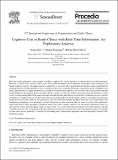Cognitive Cost in Route Choice with Real-Time Information: An Exploratory Analysis
Author(s)
Gao, Song; Frejinger, Emma; Ben-Akiva, Moshe E.
DownloadGao-2011-Cognitive Cost in Ro.pdf (603.8Kb)
PUBLISHER_CC
Publisher with Creative Commons License
Creative Commons Attribution
Terms of use
Metadata
Show full item recordAbstract
Real-time traffic information is increasingly available to support route choice decisions by reducing the travel time uncertainty. However it is likely that a traveler cannot assess all available information on all alternative routes due to time constraints and limited cognitive capacity. This paper presents a model that is consistent with a general network topology and can potentially be estimated based on revealed preference data. It explicitly takes into account the information acquisition and the subsequent path choice. The decision to acquire information is assumed to be based on the cognitive cost involved in the search and the expected benefit defined as the expected increase in utility after the search. A latent class model is proposed, where the decision to search or not to search and the depth of the search are latent and only the final path choices are observed. A synthetic data set is used for the purpose of validation and ease of illustration. The data are generated from the postulated cognitive-cost model, and estimation results show that the true values of the parameters can be recovered with enough variability in the data. Two other models with simplifying assumptions of no information and full information are also estimated with the same set of data with significantly biased path choice utility parameters. Prediction results show that a smaller cognitive cost encourages information search on risky and fast routes and thus higher shares on those routes. As a result, the expected average travel time decreases and the variability increases. The no-information and full-information models are extreme cases of the more general cognitive-cost model in some cases, but not generally so, and thus the increasing ease of information acquisition does not necessarily warrant a full-information model.
Date issued
2011-05Department
Massachusetts Institute of Technology. Department of Civil and Environmental EngineeringJournal
Procedia - Social and Behavioral Sciences
Publisher
Elsevier
Citation
Gao, Song, Emma Frejinger, and Moshe Ben-Akiva. “Cognitive Cost in Route Choice with Real-Time Information: An Exploratory Analysis.” Procedia - Social and Behavioral Sciences 17 (2011): 136–149.
Version: Final published version
ISSN
18770428